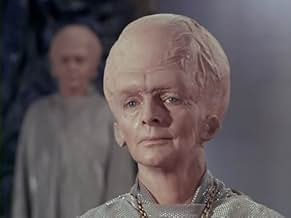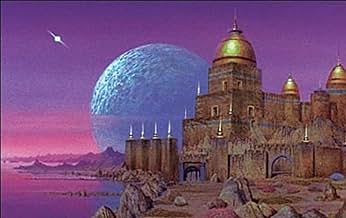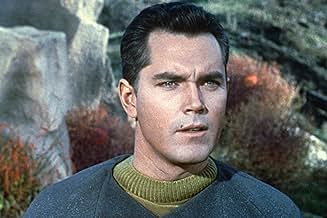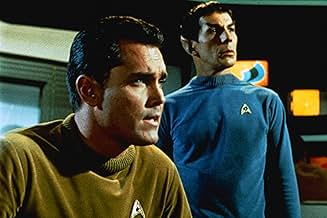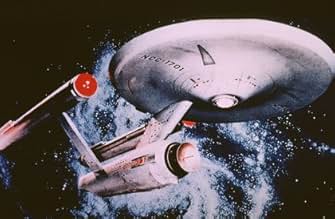The Cage
- Episode aired Oct 4, 1988
- TV-PG
- 1h 3m
IMDb RATING
7.6/10
7.7K
YOUR RATING
Capt. Pike is held prisoner and tested by aliens who have the power to project incredibly lifelike illusions.Capt. Pike is held prisoner and tested by aliens who have the power to project incredibly lifelike illusions.Capt. Pike is held prisoner and tested by aliens who have the power to project incredibly lifelike illusions.
Majel Barrett
- Number One
- (as M. Leigh Hudec)
John Burnside
- Bridge Crewmember
- (uncredited)
Carol Daniels
- Bridge Crewmember
- (uncredited)
Michael Dugan
- The Kalar Warrior
- (uncredited)
Sandra Lee Gimpel
- Talosian
- (uncredited)
Clegg Hoyt
- Transporter Chief Pitcairn
- (uncredited)
Anthony Jochim
- Third Survivor
- (uncredited)
Bob Johnson
- First Talosian
- (voice)
- (uncredited)
Jon Lormer
- Dr. Theodore Haskins
- (uncredited)
Ed Madden
- Enterprise Geologist
- (uncredited)
William McCarter
- Survivor
- (uncredited)
Featured reviews
Season 1, episode 0. This is the original pilot episode of Star Trek. It is copyrighted 1964, was completed in 1965. It was released on VHS in 1986 and first aired on television in 1988. This episode was reworked into the season 1, two part episode (episodes 11 & 12) called "The Menagerie". "Where No Man Has Gone Before" became the pilot episode for Star Trek TOS by orders of the network.
This pilot is much like the Star Trek we all come to know but not with Captain James T. Kirk commanding the Enterprise, instead it is Captain Christopher Pike in command.
The Vulcan Mr. Spock is in this episode - played by Leonard Nimoy - but the character is a bit different. Here we have a young, eager to learn Spock instead of the well seasoned and logical Spock that we all know from the rest of the episodes.
Majel Barrett is in the pilot as Number One. After this episode Barrett played the role of Nurse Chapel and the voice of the ship's computer.
The Cage was considered to be partly lost, only known footage to survive was from The Menagerie, outside of some b&w footage Roddenberry had made on 16mm for reference purposes - that must have been put together to create the 1986 VHS tape because in 1987 a film archivist found an unmarked and must 35mm of The Cage with the unused trimmed footage. Using the Menagerie, 35mm with the cut scenes, the archivist put the film back together - thus we have a fairly good restoration of The Cage today.
Recommended viewing for Star Trek fans and Sci-Fi fans in general. The Cage does have a lot of things that made Star Trek "Star Trek" but with some noticeable differences.
I am fond of this episode that was once thought lost.
8.5/10
This pilot is much like the Star Trek we all come to know but not with Captain James T. Kirk commanding the Enterprise, instead it is Captain Christopher Pike in command.
The Vulcan Mr. Spock is in this episode - played by Leonard Nimoy - but the character is a bit different. Here we have a young, eager to learn Spock instead of the well seasoned and logical Spock that we all know from the rest of the episodes.
Majel Barrett is in the pilot as Number One. After this episode Barrett played the role of Nurse Chapel and the voice of the ship's computer.
The Cage was considered to be partly lost, only known footage to survive was from The Menagerie, outside of some b&w footage Roddenberry had made on 16mm for reference purposes - that must have been put together to create the 1986 VHS tape because in 1987 a film archivist found an unmarked and must 35mm of The Cage with the unused trimmed footage. Using the Menagerie, 35mm with the cut scenes, the archivist put the film back together - thus we have a fairly good restoration of The Cage today.
Recommended viewing for Star Trek fans and Sci-Fi fans in general. The Cage does have a lot of things that made Star Trek "Star Trek" but with some noticeable differences.
I am fond of this episode that was once thought lost.
8.5/10
As Mr Spock would say - "Fascinating". I'd only ever seen this pilot episode when it was very cleverly spliced into the Series One two-parter "The Menagerie", but it was great to view it at last as a stand-alone programme. This is the way "Star Trek" might have turned out if this introduction had caught on originally with the commissioning powers-that-be, which only adds to the interest as the keen Trekkie looks for the similarities and dissimilarities between what we have here and what would come to be only a couple of years later when James T Kirk, Bones, Scotty and all joined Spock, the only retained character from "The Cage" on the Enterprise.
So we get the familiar Enterprise craft and bridge, all the sound effects and devices like phasers, transporter and communicators. There are no real titles as such however, likewise the famous theme music isn't played from the outset and of course there's no "captain's log" either. Interestingly Captain Pike uses the phrase "Engage" which skipped Kirk but ended up in the vocabulary of the next captain, Picard, played memorably by Patrick Stewart.
With the exception of Jeffrey Hunter as Captain Pike (who sadly died only a few years after this was made) and naturally Leonard Nimoy as Spock, I'm not sure I'd have retained any of the precursor characters here, but obviously I might be doing the actors a disservice through the simple expedience of unfamiliarity. Susan Devine makes for a pretty temptress to the smitten captain.
Anyway, the story itself is terrific, suitably out of this world, delivering a thoughtful but imaginative narrative with as much psychology to ponder as action to thrill to.
Proof that Captain Kirk did in fact boldly go where man had actually gone before.
So we get the familiar Enterprise craft and bridge, all the sound effects and devices like phasers, transporter and communicators. There are no real titles as such however, likewise the famous theme music isn't played from the outset and of course there's no "captain's log" either. Interestingly Captain Pike uses the phrase "Engage" which skipped Kirk but ended up in the vocabulary of the next captain, Picard, played memorably by Patrick Stewart.
With the exception of Jeffrey Hunter as Captain Pike (who sadly died only a few years after this was made) and naturally Leonard Nimoy as Spock, I'm not sure I'd have retained any of the precursor characters here, but obviously I might be doing the actors a disservice through the simple expedience of unfamiliarity. Susan Devine makes for a pretty temptress to the smitten captain.
Anyway, the story itself is terrific, suitably out of this world, delivering a thoughtful but imaginative narrative with as much psychology to ponder as action to thrill to.
Proof that Captain Kirk did in fact boldly go where man had actually gone before.
Watching Star Trek's first pilot episode The Cage is like watching a historical what if taking place. Famously deemed "too cerebral" at the time of its production The Cage is where one of the most popular television programs of all time got its beginning. While it might be the beginning that never went much further, forty-five years later it is still a compelling piece of entertainment.
To begin with The Cage features some nice performances that make it a tragedy that never got to be developed past this one story. The best example of this is Jeffrey hunter as Enterprise captain Christopher Pike. Hunter's Pike comes across as being perhaps more sensitive then the later Captain Kirk yet just as tough. It's also interesting to note Leonard Nimoy as Spock and contrast his performance here with his later performances as the Spock of The Cage seems a bit less logical and a little more emotional. There's also a nice performance from Susan Oliver in the multiple guises of Vina which show off some considerable talent. Not to mention performances from Majel Barrett and John Hoyt amongst others.
The Cage is also blessed with some nice production values. In particular in the make-up and costumes of the Tallosians which stand-up relatively well even forty-five years later. The sets and the vast majority of the other costumes, while definite sixties creations like many of those in Star Trek: The Original Series, are nice guesses all things considered. There's also an exciting and well staged fight sequence in the middle of the story. Last but not least there's the score by Alexander Courage which shows off not only the Star Trek theme but Courage's skills as a composer. Together they show an inkling of what might have been if this version of Star Trek had not been aborted.
That said everything isn't perfect. If anything can be said to be a major drawback to The Cage it is the special effects. While most of them are passable and still work, some don't. This is especially true of the shots of the Enterprise itself which are far from convincing most of the time. There's also the matter of the warp sequence which looks to be incredibly cheaply done. That said there's also some fine effects like the sequence with Vina at the episodes end. The effects might be questionable but they serve the story well for the most part.
If any single element of The Cage stands out today it is the Gene Roddenberry script. Once you get passed some of the clunky techobabel and some of the dated dialog (like Pike's "women on the bridge" line early on in the episode) there is an intriguing and compelling tale. Beneath the surface it is a tale of a society so lost obsessed with illusion it has lost its other knowledge and its morality (an unintended metaphor for fandom perhaps?). It is also the tale of a man (Pike) who seeks to escape his responsibility and rebels when given the chance. It also contains a Nice little romance in the midst of a nicely constructed story that is far from intrusive and rather compliments the story by giving it an emotional anchor. It's no mistake that The Cage in a later form (the Original Series two-part story The Menagerie) won the Hugo Award which convinces me that, given some editing, The Cage would be just as compelling and watchable today.
The Cage stands as an interesting piece of television history. With nice performances, good production values and a script as impressive now as it was then The Cage represents the beginning of one of television's most popular series. It also stands out as a fascinating what if of how Star Trek might have been.
To begin with The Cage features some nice performances that make it a tragedy that never got to be developed past this one story. The best example of this is Jeffrey hunter as Enterprise captain Christopher Pike. Hunter's Pike comes across as being perhaps more sensitive then the later Captain Kirk yet just as tough. It's also interesting to note Leonard Nimoy as Spock and contrast his performance here with his later performances as the Spock of The Cage seems a bit less logical and a little more emotional. There's also a nice performance from Susan Oliver in the multiple guises of Vina which show off some considerable talent. Not to mention performances from Majel Barrett and John Hoyt amongst others.
The Cage is also blessed with some nice production values. In particular in the make-up and costumes of the Tallosians which stand-up relatively well even forty-five years later. The sets and the vast majority of the other costumes, while definite sixties creations like many of those in Star Trek: The Original Series, are nice guesses all things considered. There's also an exciting and well staged fight sequence in the middle of the story. Last but not least there's the score by Alexander Courage which shows off not only the Star Trek theme but Courage's skills as a composer. Together they show an inkling of what might have been if this version of Star Trek had not been aborted.
That said everything isn't perfect. If anything can be said to be a major drawback to The Cage it is the special effects. While most of them are passable and still work, some don't. This is especially true of the shots of the Enterprise itself which are far from convincing most of the time. There's also the matter of the warp sequence which looks to be incredibly cheaply done. That said there's also some fine effects like the sequence with Vina at the episodes end. The effects might be questionable but they serve the story well for the most part.
If any single element of The Cage stands out today it is the Gene Roddenberry script. Once you get passed some of the clunky techobabel and some of the dated dialog (like Pike's "women on the bridge" line early on in the episode) there is an intriguing and compelling tale. Beneath the surface it is a tale of a society so lost obsessed with illusion it has lost its other knowledge and its morality (an unintended metaphor for fandom perhaps?). It is also the tale of a man (Pike) who seeks to escape his responsibility and rebels when given the chance. It also contains a Nice little romance in the midst of a nicely constructed story that is far from intrusive and rather compliments the story by giving it an emotional anchor. It's no mistake that The Cage in a later form (the Original Series two-part story The Menagerie) won the Hugo Award which convinces me that, given some editing, The Cage would be just as compelling and watchable today.
The Cage stands as an interesting piece of television history. With nice performances, good production values and a script as impressive now as it was then The Cage represents the beginning of one of television's most popular series. It also stands out as a fascinating what if of how Star Trek might have been.
This is one of my very favorite episodes, and I've always wondered what a Star Trek with Captain Pike would have been like. It has excitement, suspense, and even a thinking plot. It definitely works much better as a stand-alone episode than it does as a backdrop for "The Menagerie". In that capacity, it is used as a flashback to propel a very odd story where Spock commandeers the Enterprise to deliver a badly injured Pike to what appears to be a morally bankrupt race so he can live out an illusion of a normal life. Very un-Spock like IMHO.
That said, it seems apparent to me that Gene Roddenberry lifted some very obvious plot ideas for this pilot from the Twilight Zone episode "People Are Alike All Over". He even borrowed actress Susan Oliver who appeared in that episode in a similar role and a with a similar name ("Teenya" vs "Vina").
That said, it seems apparent to me that Gene Roddenberry lifted some very obvious plot ideas for this pilot from the Twilight Zone episode "People Are Alike All Over". He even borrowed actress Susan Oliver who appeared in that episode in a similar role and a with a similar name ("Teenya" vs "Vina").
This show should not be compared to the later Star Trek series, except for the title. This sci-fi ouclassed other shows of the time 2 to 1. There had never been anything like this on television up to this point.
Jeffery Hunter portrays a good starship captain. The supporting cast do an admirable job, too.
Sure, the effects look cheap, but, hey... this was a PILOT for the series. This story was good enough to be decked out into a 2-parter episode in the Star Trek series that began the next year in 1966.
I am glad that Paramount released this show to the home market. It stands alone in its simple story of space travel. And it works!
Jeffery Hunter portrays a good starship captain. The supporting cast do an admirable job, too.
Sure, the effects look cheap, but, hey... this was a PILOT for the series. This story was good enough to be decked out into a 2-parter episode in the Star Trek series that began the next year in 1966.
I am glad that Paramount released this show to the home market. It stands alone in its simple story of space travel. And it works!
Did you know
- TriviaThe original script called for the aliens to be crab-like arthropods. Since the budget would not allow this, they were made into humanoids with bulging brains, beginning a Star Trek tradition of almost all aliens being of a shape that could be easily played by human actors.
- GoofsAs Pike retreats up the stairs from the warrior on "Rigel VII", you can see the blade of his spear bend as it pushes against the warrior's chest.
- Alternate versionsSpecial Enhanced version Digitally Remastered with new exterior shots and remade opening theme song
- ConnectionsEdited into Star Trek: The Menagerie: Part I (1966)
- SoundtracksStar Trek Theme (Original TV Series Version)
(uncredited)
Details
- Release date
- Country of origin
- Official sites
- Language
- Also known as
- Star Trek the Original Series: The Cage
- Filming locations
- Production company
- See more company credits at IMDbPro
Contribute to this page
Suggest an edit or add missing content


